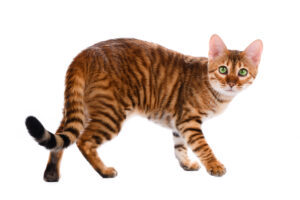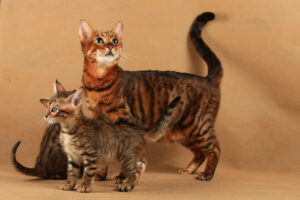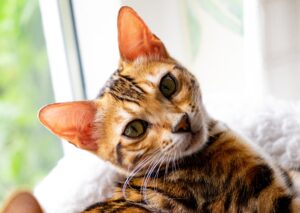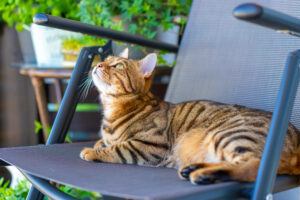
The Toyger, easily mistaken for "tiger" upon hearing, is a relatively new and not yet widely spread cat breed in Japan.
While it sports a tiger-like appearance, it possesses a true feline personality.
If you've become curious about what kind of cat a Toyger is, why not learn more about them and consider living together?
Table of Contents
1. What is a Toyger?
∟1-1. The History of Toygers
∟1-2. The Origin of the Name "Toyger"
∟1-3. The Strict Pattern Assessment of Toygers
2. Points to Consider When Living with a Toyger
∟2-1. The Personality of a Toyger
∟2-2. Attention Needed for the Playing Environment
∟2-3. Toygers Love to Be Pampered and Petted
3. Diseases to Be Aware of When Living with a Toyger
∟3-1. The Most Critical Disease for Toygers: Feline Infectious Peritonitis
∟3-2. Pay Attention to Changes for Heart Disease
∟3-3. Keeping the Kidneys Healthy Means Drinking Water
Summary
1. What is a Toyger?

The Toyger, a cat breed not yet familiar in Japan, is named for its resemblance to a tiger, although its characteristics and nature are still largely unknown.
First, let's introduce what kind of cat a Toyger is.
;
1-1. The History of Toygers
The Toyger breed originated in the 1980s, often bred with the intent of creating "cute" cats. The Toyger, however, began as a serendipitous breed.
In the United States, a Bengal breeder discovered a cat with a tiger-like pattern, sparking the idea to breed a cat with a tiger's appearance. This led to the eventual breeding of Toygers.
They were preliminarily registered with TICA in 1993 and officially in 2006, after a period of observation to ensure they did not suffer from genetic diseases or short lifespans, which would be ethically problematic.
Toygers, now officially recognized, continue to gain popularity worldwide.
1-2. The Origin of the Name "Toyger"
The name "Toyger" is a blend of "toy" and "tiger", suggesting a domestic alternative to living with a real tiger, which would be impractical for most people outside of heavyweight champions like Mike Tyson.
Despite the aggressive image some may have of tigers, even wild tigers exhibit cat-like behaviors when relaxed.
Living with a Toyger offers a glimpse into such tiger-like aspects.
1-3. The Strict Pattern Assessment of Toygers
The most critical aspect of being recognized as a Toyger is having the circular tiger pattern. Without it, they would not be distinguishable from Bengals.
In Japan, striped cats are often referred to as "tora" (tiger), such as "kijitora" or "sabatora". This is why the Toyger's pattern is strictly assessed to differentiate it from other striped cats.
2. Points to Consider When Living with a Toyger

We'll introduce how best to interact with Toygers and what you should be mindful of when living with one.
Since each cat breed has a different personality, knowing how to approach them is vital for building a trusting relationship.
Additionally, it's crucial to ensure that cats do not endure undue stress, as it's the responsibility of humans to foster a harmonious living environment.
2-1. The Personality of a Toyger
Though muscular and wild-looking, Toygers are actually gentle and bond well with humans, making them suitable even for first-time cat owners.
They are curious and enjoy playing, showing high intelligence, which often means they require little training.
Misbehavior is usually a sign of stress or some underlying issue, so it's important to investigate the cause when they start acting out.
2-2. Attention Needed for the Playing Environment
Toygers, being playful, will eagerly engage with toys. Playing not only relieves stress but also strengthens their bond with humans.
However, ensure the play area is safe to prevent injuries. Also, installing a cat tower can satisfy their need for physical exercise.
2-3. Toygers Love to Be Pampered and Petted
Toygers, being affectionate, build trust through interaction. While they need exercise, they thrive on human companionship and tend to bond with those who give them the most attention.
Building a deep relationship with a Toyger involves lots of love and care.
3. Diseases to Be Aware of When Living with a Toyger

When living with a cat, it's important to be aware of potential health issues, as cats do not typically communicate discomfort or illness.
We'll introduce some diseases that Toygers are particularly susceptible to, so you can be vigilant in their care.
3-1. The Most Critical Disease for Toygers: Feline Infectious Peritonitis
Feline Infectious Peritonitis (FIP) is a significant concern for Toygers, characterized by a high mortality rate and difficulty in diagnosis. It's a viral disease that becomes dangerous when the virus mutates inside the cat.
Toygers have been reported to have a higher incidence of FIP, making it one of the most dangerous diseases for them.
If your Toyger shows signs of lethargy or other symptoms, it's crucial to have them examined by a vet.
3-2. Pay Attention to Changes for Heart Disease
Hypertrophic cardiomyopathy is common in cats and can be fatal if not detected early. Regular check-ups are recommended to catch any signs of heart disease.
3-3. Keeping the Kidneys Healthy Means Drinking Water
Kidney disease is a risk for all older cats. Encouraging your Toyger to drink more water can help prevent kidney issues.
Ensuring fresh water is always available and placing water bowls in various locations can increase their water intake.
Summary
The Toyger, with its small tiger appearance, is a delightful companion that enjoys both play and affection.
By creating a comfortable environment for a Toyger, you can ensure a fulfilling and healthy life together.


